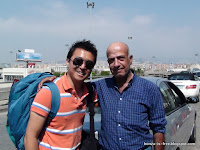Saturday May 12, 2011
The people of the Middle East are the friendliest folks you'd ever hope to meet. Strangers will willingly help you, welcome you, and invite you to their homes. As a foreigner you could not travel to a more amiable region.
However there is an odd phenomenon that I have encountered on my journeys to Arabia, the Levant and Iran, which I never experience in Europe, Asia or North America. Ninety five percent of my conversations in the Middle East would begin like this:
local: Hello, welcome to (this country). Where are you from?
me: Australia.
local: [looks confused] No, where are you originally from?
How does one answer that? I'm very proud of my Korean heritage and have nothing to hide in that respect, but I'm also very proud to be Australian. And this question is a rejection of my first answer, a denial of my nationality.
Don't get me wrong, this is a VERY minor inconvenience. I would much rather have this problem than be a person of South Asian appearance constantly being picked for "random" searches at airports (like Sharukh Khan), or, heaven forbid, be an Indigenous Australian traveller having to bear the heartbreak of being asked "No, where you originally from?"
Obviously the typical person in the Middle East does not know enough about Australia to understand that it is a multicultural nation, and follows an explicit policy of multiculturalism. The irony is, of course, that the countries in the Middle East are some of the most ethnically diverse in the world - an Israeli could be of Jewish, Arab, Armenian or Ethiopian ethnicity; an Iranian could be Persian, Kurdish, Arab, or any number of other ethnic backgrounds.
Of course, the local in this situation is being hospitable and does not mean to cause any offence. And while I would like to make the person realise that the question is inappropriate, I'm not in the habit of picking confrontations with locals while I'm a visitor to their country.
So while I would love to come back with "Excuse me, would you ask a black American which part of Africa they originally came from?" or "Why do you not ask my lilly white companion Adam which part of Europe he is originally from?", most of the time I would tell them what they expect to hear.
But many times, when I think it's not too blunt, I would educate by letting them know that Australia has peoples of many colours, just like Britain or the United States. I hope that piece of information would plant a seed in their mind about what multiculturalism means, and contribute in a small way to future peace in this region.
The people of the Middle East are the friendliest folks you'd ever hope to meet. Strangers will willingly help you, welcome you, and invite you to their homes. As a foreigner you could not travel to a more amiable region.
However there is an odd phenomenon that I have encountered on my journeys to Arabia, the Levant and Iran, which I never experience in Europe, Asia or North America. Ninety five percent of my conversations in the Middle East would begin like this:
local: Hello, welcome to (this country). Where are you from?
me: Australia.
local: [looks confused] No, where are you originally from?
How does one answer that? I'm very proud of my Korean heritage and have nothing to hide in that respect, but I'm also very proud to be Australian. And this question is a rejection of my first answer, a denial of my nationality.
 |
| Me and Eli, our driver in Lebanon |
Obviously the typical person in the Middle East does not know enough about Australia to understand that it is a multicultural nation, and follows an explicit policy of multiculturalism. The irony is, of course, that the countries in the Middle East are some of the most ethnically diverse in the world - an Israeli could be of Jewish, Arab, Armenian or Ethiopian ethnicity; an Iranian could be Persian, Kurdish, Arab, or any number of other ethnic backgrounds.
Of course, the local in this situation is being hospitable and does not mean to cause any offence. And while I would like to make the person realise that the question is inappropriate, I'm not in the habit of picking confrontations with locals while I'm a visitor to their country.
 |
| Me and Adam at Qadisha Valley, Lebanon |
So while I would love to come back with "Excuse me, would you ask a black American which part of Africa they originally came from?" or "Why do you not ask my lilly white companion Adam which part of Europe he is originally from?", most of the time I would tell them what they expect to hear.
But many times, when I think it's not too blunt, I would educate by letting them know that Australia has peoples of many colours, just like Britain or the United States. I hope that piece of information would plant a seed in their mind about what multiculturalism means, and contribute in a small way to future peace in this region.
No comments:
Post a Comment